AI has powered marketing automation for years: optimizing send times, segmenting lists, and drafting subject lines. At Mavlers, too, our email marketing team has been helping CRM clients harness marketing automation and AI to create campaigns that work harder, scale faster, and convert better. But a new wave, agentic AI, is changing the game. Unlike traditional tools that wait for prompts, these agents act like autonomous specialists: they set goals, experiment, adapt in real time, and improve campaigns with minimal oversight.
For email marketers, this means less time tweaking workflows and more time focusing on strategy and creative. Adoption is already accelerating. PwC reports 79% of companies are experimenting with AI agents, and 66% see measurable productivity gains.
So the question is no longer “if” but how agentic AI is reshaping email marketing.
That’s what we’ll unpack today by looking at some popular artificial intelligence marketing tools.
But first, it’s important we draw a line between traditional artificial intelligence marketing tools and AI-powered agents.
AI marketing automation tools: What’s the difference between AI and agentic AI?
The main difference between AI and Agentic AI lies in autonomy, goal-setting, and adaptability. While traditional AI systems generally perform tasks based on predefined rules, prompts, or models, agentic AI systems actively set goals, make decisions, adapt in real time, and execute multi-step actions with minimal human oversight.
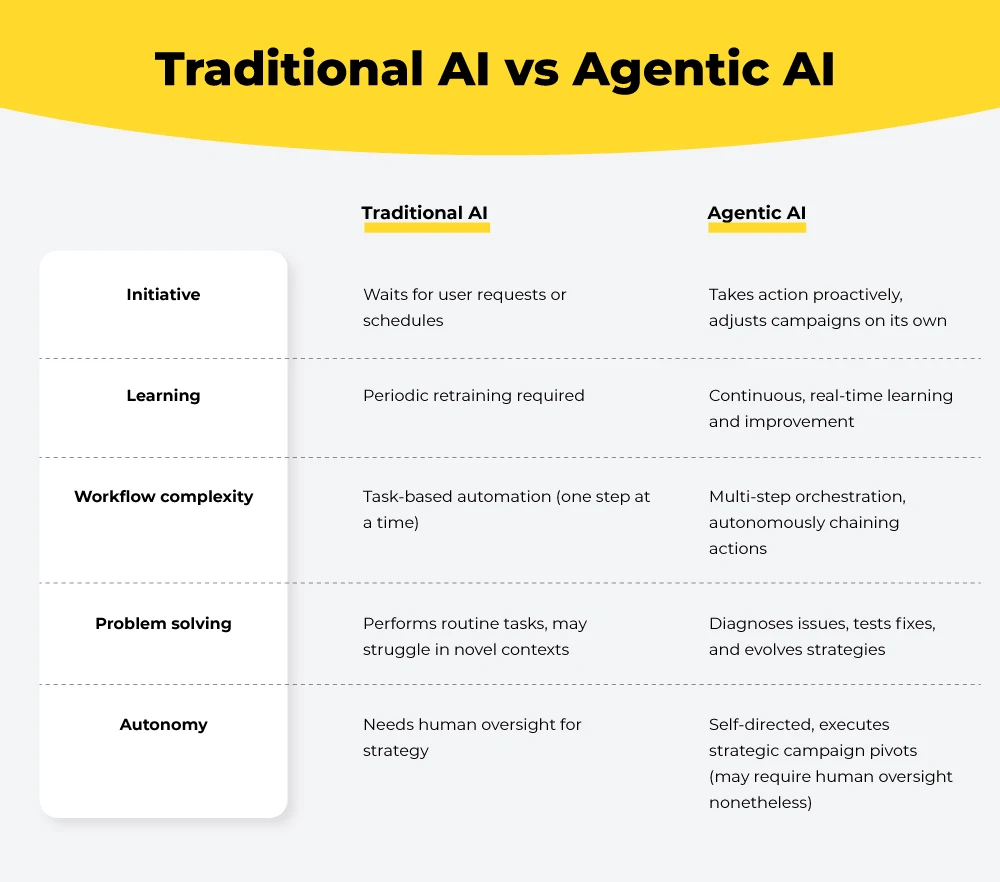
As far as email marketing is concerned, traditional artificial intelligence marketing tools are reactive and rule-based. They’re used for:
- Automating repetitive tasks like list segmentation, subject line optimization, spam filtering, and A/B testing.
- Generating email copy variations or recommending send times, but only when prompted by a marketer.
- Applying algorithms trained on historical data to personalize or target messaging.
Agentic AI marketing automation tools, on the other hand, act as autonomous marketing specialists, actively setting and pursuing campaign goals, learning from results, and adapting strategies in real time. An AI agent:
- Proactively analyzes campaign performance, identifies underperformance, and autonomously experiments with new subject lines, formats, segmentation, and send times.
- Initiates multi-step workflows, like sending follow-up emails based on engagement, resegmenting lists on the fly, and booking meetings if a recipient shows interest.
- Coordinates across platforms—pulling CRM data, triggering SMS reminders, and adjusting entire drip sequences
Keeping these distinctions in mind, in this roundup, we’re highlighting only those CRMs that have officially integrated agentic AI into their platforms.
The lineup includes HubSpot, Salesforce, Klaviyo, Braze, Brevo, and ActiveCampaign.
(Please note that Iterable’s AI agent is not part of this list as we’ve already reviewed it in our Iterable Nova blog post. Read it here.)
6 agentic artificial intelligence marketing tools
So let’s take a closer look at these ESPs that are already putting agentic AI into action.
1. HubSpot: Breeze AI
HubSpot’s network of autonomous AI agents, now part of its Breeze automation suite, are deeply embedded in CRM, marketing, sales, and support workflows.
HubSpot agents learn from interactions, refine campaign targeting, and automate cross-team collaboration—connecting insights from marketing emails, sales lead behaviors, and customer service tickets into one cohesive experience. The platform’s Agent Builder lets businesses develop and deploy custom agents, promising future-ready flexibility.
Strengths:
- Built natively into CRM for seamless integration.
- Real-time cross-department data connections for personalized customer journeys.
- AI-driven recommendations, not just rule-based triggers.
Weaknesses:
- Limited customization for advanced use cases until Agent Builder is more widely available.
- May require substantial initial data to achieve high personalization effectiveness.
HubSpot’s agentic capabilities for email marketing
It is important to note that HubSpot does not have a single, dedicated AI agent per se that is exclusively for email marketing and nothing else. Instead, it offers a suite of artificial intelligence marketing tools and agents that work together to assist with various aspects of email marketing.
HubSpot’s Content Agent may be used to create emails. Apart from that, you can use Breeze Assistant to generate emails.

Source: HubSpot Knowledge Base
In short, Breeze Assistant assists you with a task, while Breeze Agents automate an entire workflow. They are both part of the broader Breeze AI platform.
However, it’s also worth noting the separate but related project, “Agent.ai,” created by HubSpot’s founder and CTO, Dharmesh Shah. The platform has over 1800 agents, including agents for email, specifically around cold emails, subject line generators, and summarizers, which shows that HubSpot is actively pushing the frontiers of AI marketing automation.
2. Salesforce: Agentforce
Salesforce’s Einstein AI and Agentforce Platform drive intelligence across marketing, sales, and service. These agents score leads, automate campaign management, optimize ad spend, and can even interpret sentiment to suggest better replies. Einstein collects and processes CRM, social, and market data for predictive analytics, sales insights, and autonomous support ticket handling.
Strengths:
- Deep integration with data across channels (web, chat, voice, CRM).
- Robust predictive scoring, real-time optimizations, and multi-channel deployment.
- Agentforce allows for full customization, including guardrails and multi-platform support.
Weaknesses:
- Setup complexity can be challenging for smaller teams.
- Requires well-governed data structures for best results.
Salesforce’s agentic capabilities for email marketing
Agentforce can significantly help with email marketing by providing an autonomous, data-driven approach that goes far beyond traditional email automation:
- Personalized email campaigns: Agentforce can create and execute personalized email campaigns autonomously. It doesn’t just use basic merge tags; it uses AI to analyze customer behaviors, preferences, and engagement history from your Salesforce CRM data.
- Audience segmentation: Agentforce uses AI-driven insights from Salesforce Data Cloud to create highly refined audience segments. This enables hyper-personalized marketing strategies that are much more effective than traditional segmentation.
- Campaign automation and optimization: Agentforce can automate entire multi-step campaigns and optimize them in real-time.
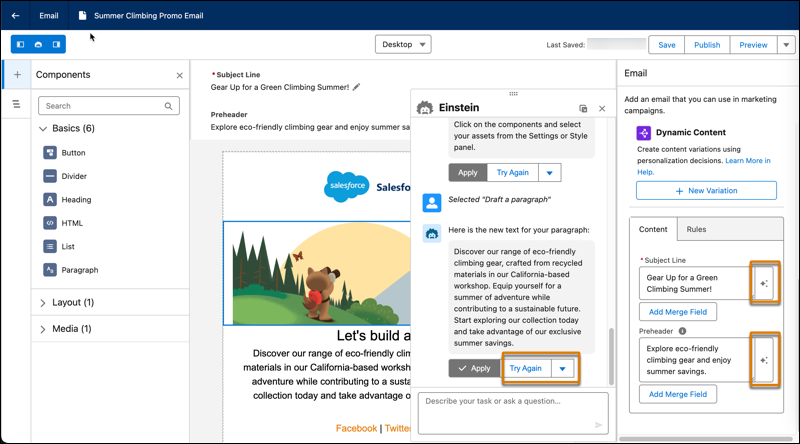
Source: Salesforce Help
Agentforce is not a simple email assistant. It’s an intelligent platform that acts as an autonomous marketing manager for a specific workflow, handling everything from data analysis and audience segmentation to content generation and real-time campaign optimization.
3. Klaviyo: Conversational AI Shopping Agent
Klaviyo’s new conversational AI agent integrates with online storefronts to offer personalized product recommendations and instant support via webchat. It auto-ingests product catalogs, FAQs, and customer data, adapting dialogue and offers to individual visitor history. This empowers brands to deliver “in-store” assistance 24/7.
Strengths:
- Quick-to-launch; works with existing storefront data.
- Multi-channel expansion in progress (SMS, WhatsApp, email).
- Cross-sell suggestions, order updates, and soon return processing.
Weaknesses:
- Limited to digital retail use cases (for now).
- Feature set still growing, depends heavily on storefront quality.
Klaviyo’s agentic capabilities for email marketing
Once again, as far as agentic AI marketing automation goes, Klaviyo doesn’t have a dedicated agent for email marketing. However, Klaviyo does offer a range of AI-powered features:
- Generative AI: This is for creating content. You can use it to draft email copy and subject lines. Klaviyo’s “Email AI” feature falls under this category. You give it a prompt, and it generates text for you to use.
- Flows AI: This is a key feature for automation. You can describe the logic for an entire email marketing automation “flow” (e.g., an abandoned cart sequence or a welcome series), and the AI will build the workflow structure for you.
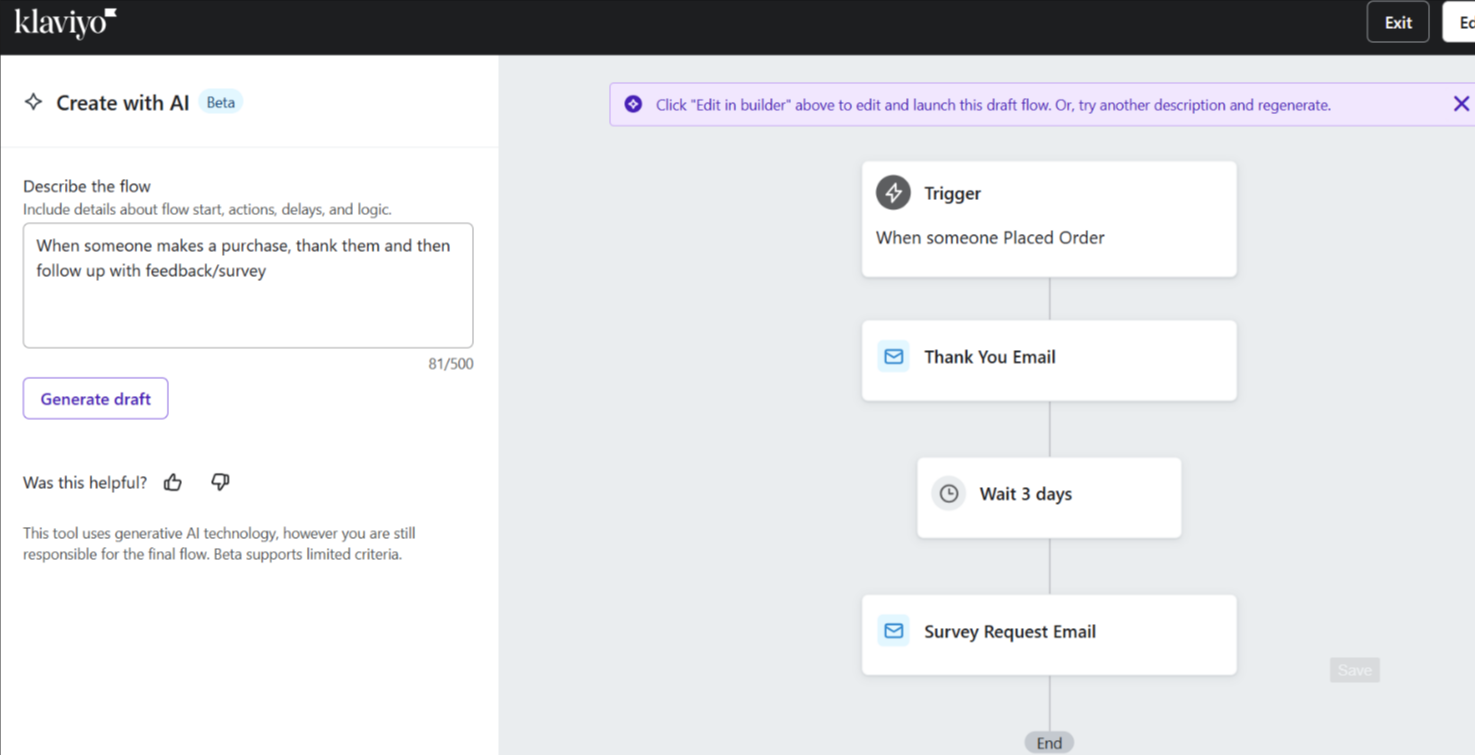
Source: Mavlers
- Predictive analytics: This AI analyzes your customer data to forecast behavior, such as a customer’s next expected order date or their lifetime value (CLV). This data then informs your email campaigns, helping you send the right message at the right time.
- Smart Send Time: This AI-driven feature automatically sends each email to a subscriber at the time they are most likely to engage, based on their past behavior.
- Segments AI: This generative AI tool helps you build complex audience segments by describing the audience you want to reach in plain language.
These tools enable marketers keen to leverage AI-driven marketing automation to deliver more personalized, timely, and effective campaigns without heavy manual input.
4. Braze: OfferFit, Project Catalyst
Braze’s OfferFit AI decisioning agent and Canvas orchestration layer constantly adapt campaigns using reinforcement learning, maximizing business metrics for each individual customer. Project Catalyst enables marketers to auto-generate experience variants (subject lines, imagery, content) and experiment at scale.
Strengths:
- True 1:1 personalization via perpetual learning agents.
- Integrates with multi-channel experiences (email, push, SMS).
- Marketers can set high-level guidelines, letting agents handle ongoing optimization.
Weaknesses:
- Requires a strong first-party data pipeline.
- Continuous testing can add operational complexity.
Braze’s agentic capabilities for email marketing
AI-driven marketing automation being central to Braze, they’re actively developing and marketing AI agents, particularly with a focus on their use in email marketing.
OfferFit, for example, works autonomously by perpetually experimenting with different send times, content, images, and offers to find the ideal mix for each individual customer. Project Catalyst is designed to allow AI agents to build highly individualized campaigns. A marketer can set high-level guidelines, and the agent will craft distinct experiences for each person.
A core aspect of Braze’s agentic capabilities for marketing, including email, is AI decisioning.
AI decisioning is the process of using AI to analyze data and make real-time decisions without human intervention. In marketing, this often means replacing rigid, rule-based workflows with dynamic, adaptive logic. For example, instead of a marketer creating a campaign that says, “send a cart abandonment email 24 hours later,” an AI decisioning system would analyze a user’s behavior and decide whether to send an email, what the content should be, and when the optimal time is, all based on that individual’s data.
A case in point is the use of Braze’s agentic AI by Kayo Sports to innovate customer experiences.
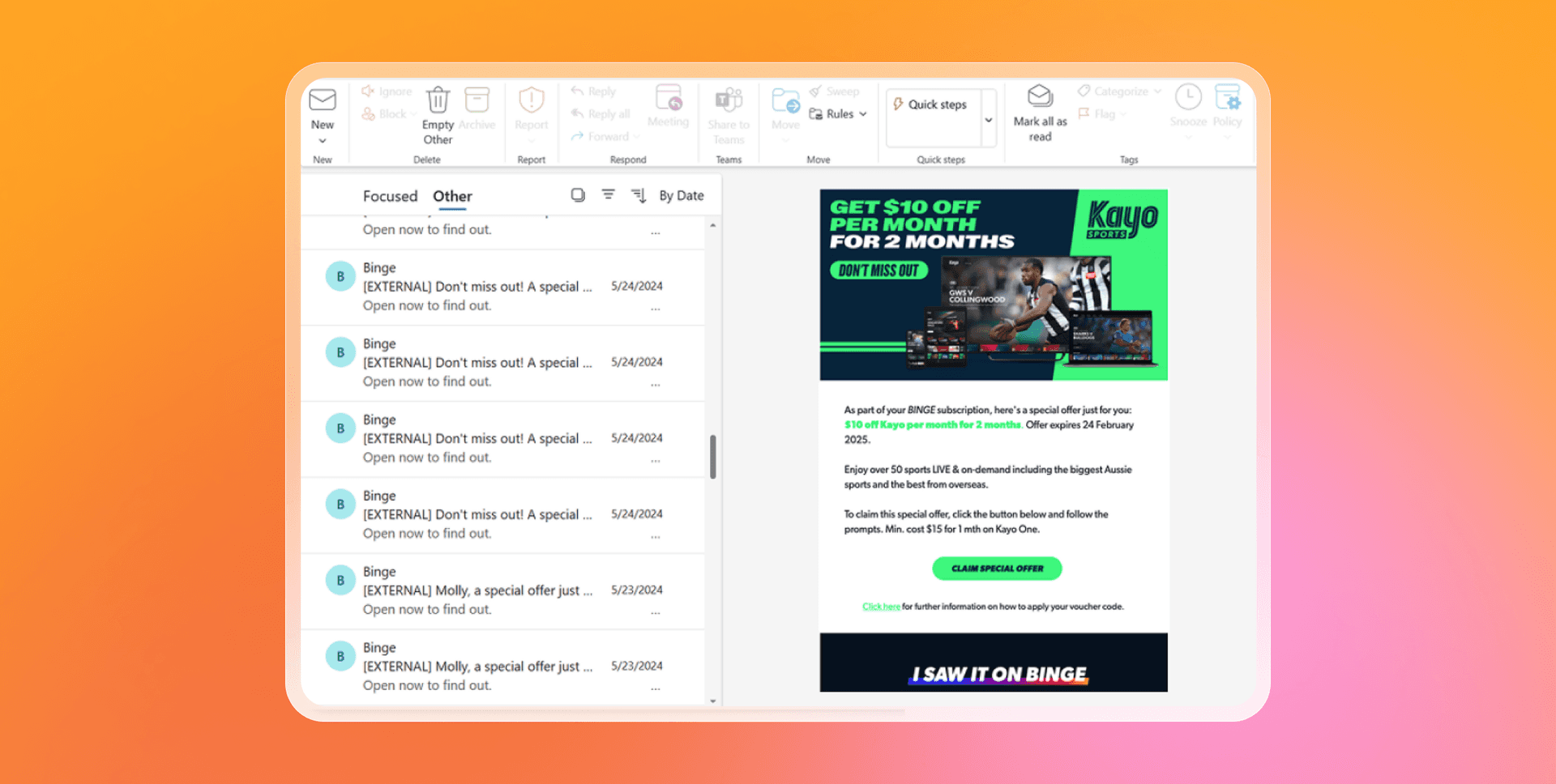
Source: Braze
“One of the ways they did this was to build a personalization engine using sophisticated AI agents, fueled by millions of gigabytes of data, to engage customers and maximize the value a subscriber will get from Kayo Sports. The resulting “Customer Cortex” is an operational brain that sits at the center of their trading engine, revolutionizing how they achieve a true 1:1 relationship with their subscribers at scale,” Braze’s case study explains.
To sum up, Braze’s strength lies in embedding agentic AI into decisioning and personalization. This approach evolves into a true 1:1 personalization engine, underscoring the broader impact of marketing automation and AI.
5. Brevo: Aura AI Agents Suite
Brevo’s Aura suite includes marketing, sales, conversations, and data management agents.
They automate content creation, segmentation, send-time optimization, and sales enrichment. Accessible via chat, Aura can personalize campaigns and refine copy instantly.
Strengths:
- Easily accessible AI agent assistant via chat and UI.
- Robust automation and data enrichment for small teams.
- Multi-role agent system (marketing, sales, support, data).
Weaknesses:
- Most powerful when integrated with Brevo’s proprietary workflows.
- Advanced sales features are still being rolled out.
Brevo’s agentic capabilities for email marketing
Aura’s Marketing agent is the most relevant for email marketing. It is a highly specialized tool designed to help marketers execute campaigns more effectively. Its capabilities include:
- Content Generation: The agent can write entire email campaigns, from subject lines and body copy to CTAs. It can also refine existing text by changing the tone, shortening it, or translating it.
- Optimal Send Time: This agent can analyze each contact’s past behavior to determine the best time to send them a message for maximum engagement.
- Smart Segmentation: It can automatically segment audiences based on real-time insights, helping marketers target the right contacts with the right message.
- Product Recommendations: The agent can integrate dynamic product recommendations into emails, personalizing content based on a contact’s browsing or purchase history.
Source: Brevo
Brevo’s other artificial intelligence marketing tools or agents include Sales agent, Conversations agent, and Data Management agent.
Brevo’s strategy is to make these specialized agents accessible directly within the platform’s user interface, either through a chat window or as integrated tools in specific features (like the email editor). This gives users the option to either use the agents as a copilot for a specific task or let them handle a larger, multi-step workflow.
6. ActiveCampaign: Active Intelligence Agents
ActiveCampaign’s suite of autonomous AI (called Active Intelligence) automates lead nurturing, real-time campaign performance tracking, predictive segmentation, and content creation.
These agents orchestrate e-commerce, email, and SMS workflows, refining strategies based on live engagement metrics.
Strengths:
- Reporting of direct impact: higher open rates, sales volume, and time savings.
- End-to-end workflow automation; from ideation to reporting.
Weaknesses:
- May require a learning period for marketers to fully leverage agent-driven insights.
- Potential SaaS stack bloat if used alongside legacy tools.
ActiveCampaign’s agentic capabilities for email marketing
ActiveCampaign has several distinct agents that are directly relevant to email marketing:
- AI Campaign Builder: This is a key agent that turns a simple text prompt into a complete email campaign. You can describe your goal in plain language, and the agent will generate the entire campaign, including the subject lines, email copy, images, CTAs, and even the automation flow.
- AI Brand Kit: This agent ensures brand consistency. It pulls your brand’s colors, fonts, logos, and social links from your website and applies them to all AI-generated emails and campaigns. This saves time and ensures every message looks and feels on-brand.
- AI Actions: These are versatile automation steps that can be embedded into any workflow. They allow you to create custom agents to perform a specific task, such as analyzing sentiment from email replies, customizing follow-up messages, or handling data on the fly.
- AI-suggested Segments: This agent analyzes your customer data to identify and suggest high-impact audience segments you might not have considered. It helps you find groups like “likely repeat buyers” or “at-risk subscribers,” which leads to more targeted and effective email campaigns.

Source: ActiveCampaign
ActiveCampaign’s platform is heavily invested in the concept of agentic AI. It markets its AI tools as specialized “agents” that can work autonomously to build, optimize, and execute entire email marketing strategies with minimal human intervention.
Agentic AI in marketing automation: Hype vs hope
Agentic AI isn’t just a shiny buzzword—it’s already shifting how marketing teams work. Brands using agents report faster personalization, higher engagement, and measurable lifts in ROI. But results vary. These tools demand the right data, clear strategy, and strong governance to avoid wasted effort or ethical missteps.
Industry leaders agree.
Expert perspectives:
- Dikshant Dave (CEO, Zigment) notes that the next-generation CMO is a strategic leader empowered by AI, not supplanted by it. AI tackles tactical execution, freeing leaders for innovation and brand-building.
- Prasad Thammineni (Agentman.ai) advises a mindset shift. Ownership of first-party data enriched by AI becomes a key competitive advantage in a privacy-driven era.
- Nicholas Holland (Head of AI, HubSpot) highlights the evolution from managing people to orchestrating AI agents, requiring leaders to continuously adapt their strategic vision.
Best practices for marketers:
- Prioritize vendors who demonstrate robust data security, ongoing data accuracy checks, and offer transparency on their AI models and data sources.
- Define strict rules around brand voice, personalization limits, privacy standards, and opt-in compliance.
- Invest in training marketers to understand AI capabilities, limitations, and ethical risks. Equip them to challenge AI assumptions.
- Agentic AI should be managed as part of a formal AI governance council or ethics board that regularly evaluates AI’s impact, updates policies, and aligns AI marketing operations with business goals and social responsibility.
- Position agentic AI as a smart assistant providing data-driven insights, copy drafts, and optimization suggestions, while final creative decisions remain with skilled humans ensuring brand cohesion and emotional resonance.
Ultimately, adopting agentic AI-driven marketing automation isn’t just about deploying smarter tools, it’s about building the right guardrails. In fact, the latter is the more critical thing.
AI in marketing automation: Wrap-up
Agentic AI marking automation isn’t just a buzzword, it’s already changing how email marketing works across leading ESPs like HubSpot, Salesforce, Klaviyo, Braze, Brevo, and ActiveCampaign. These platforms prove that when AI agents handle the repetitive and the complex, your teams gain the freedom to focus on strategy, creativity, and building customer relationships that last.
The opportunity is real, but so is the responsibility. Success with agentic AI isn’t about chasing every new tool, it’s about adopting the right ones, setting the right guardrails, and building a strategy that amplifies human creativity.
If you’re ready to explore how agentic AI can help scale personalization, streamline workflows, and drive growth, start with a small pilot, measure results, and expand what works.Let’s discuss how we can help you harness these tools and turn AI-powered automation into your competitive advantage. Book a free 30-min no-obligation call with us!

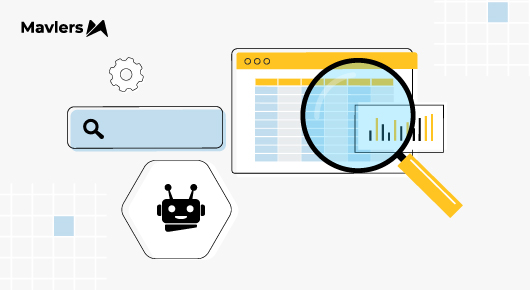

Kath Pay - Reviewer
Kath, the Founder and CEO of Holistic Email Marketing, is a veteran in the email marketing industry. A renowned international keynote speaker and one of the UK’s leading email marketing tutors, she is widely recognized for her expertise and thought leadership in the field.
Susmit Panda - Content Writer
A realist at heart and an idealist at head, Susmit is a content writer at Mavlers. He has been in the digital marketing industry for half a decade. When not writing, he can be seen squinting at his Kindle, awestruck.
Scaling audience targeting & lead qualification with Marketo Smart Lists
Are your links paying off? Here’s how to measure link-building ROI that matters